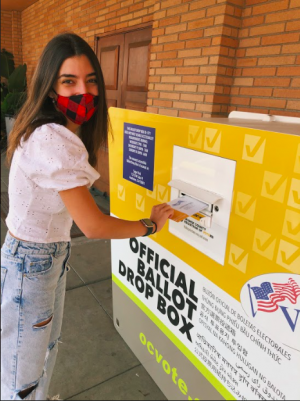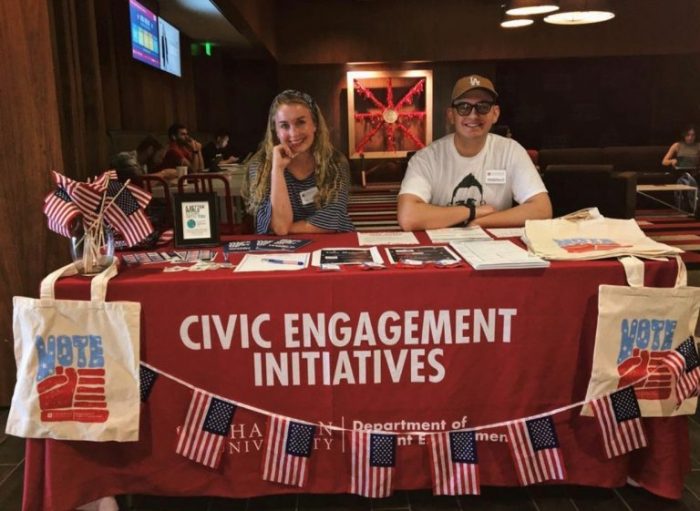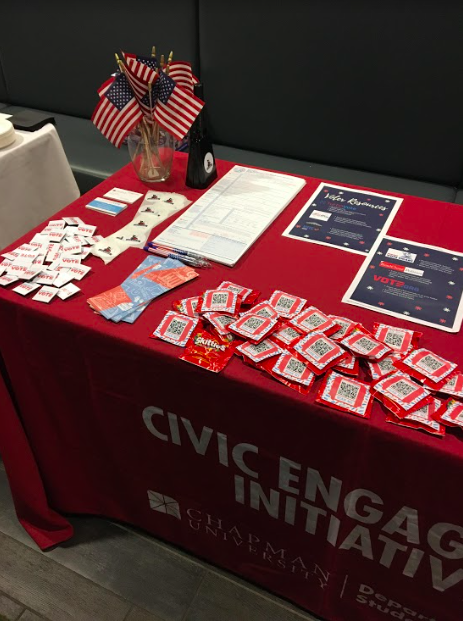
November 3 is here. Did you VOTE ? Will you vote?
The pundits say it’s an election like no other, but that’s because Donald Trump has been a president like no other.
Political science part-time lecturer Lewis Luartz criticizes students who sit out the election because they don’t think their vote will count. But no vote should be overlooked this time, he insists.
“Trump has been breaking the mold as president in ways that hurt democracy,” Luartz said. “I think political scientists, voters, and politicians alike are noticing this much more as we get closer to the election.”
Despite the pandemic, despite few students around campus these days, Chapman officials say they expect actual lines at the on-campus voting center at Argyros Forum.
The center first opened Oct. 30 and remained open through Nov. 2.
On Nov. 3, election day, the hours will be from 7 a.m. to 8 p.m.
A change in rules: You must social distance and you must wear a mask to vote.
In the March primary, the Chapman voting lines were long (over an hour wait at times). But even with fewer students on campus, Assistant Dean of Students Chris Hutchison predicts there could be waiting at times. In part that’s because it won’t be just students voting. The county Registrar of Voters asked the university to permit community voting there too.
“It’s a vote center for the county,” Hutchison said. “And if you look at the news sources, vote is already high.”
Voter registration had fallen off in the early stages of the pandemic. But the Brennan Center for Justice at New York University’s law school said that changed with the Black Lives Matter protests, and that May saw a huge increase in registration.
In California, more than 84% of eligible voters are registered to vote. And across the nation, mail-in voting has reached record numbers.
“It’s unprecedented,” said Michael McDonald, political science professor at the University of Florida, who manages the U.S. Elections Project.
About 30 percent of the 138.8 eligible voters in the U.S. have already voted.

Chapman University has made efforts alongside the Civic Engagement Initiatives (CEI) team to increase student voting, including the university’s pledge with a nationwide nonpartisan democratic initiative.
President Daniele Struppa hopes students understand millions of people in other countries wish to vote but do not have the right to do so.
“We live in difficult times and the nation is more divided than I have ever seen it,” Struppa said. “I think voting is the most effective way for people, not just our students, to make themselves heard.”
But there are skeptics.
Despite the university’s efforts, Zoe Bell, a sophomore political science major, will abstain from voting for a presidential candidate but will vote for other offices.
“Americans have this perverse relationship with politics where they believe their capacity to change begins and ends with electoralism,” Bell said. “It’s really insane, almost nowhere else in the world has this mindset that we have. If you tell an American you’re not voting, they automatically assume it’s because you don’t care about politics, when it’s often the exact opposite.”

The real way to make change is through direct participation, she believes: “Join a union, work with activist groups, [and] organize protests. These are all valuable [acts] that led to some of the biggest shifts in history. The March on Washington, the Black Panther Party, and the Stonewall [uprising did not happen through] electoral politics.”
Sociology professor Tekle Woldemikael said there is good reason why some students won’t vote:
“The candidates don’t represent what’s going on and the young generation is on a different page,” Woldemikael said.
But he also believes many skeptical young voters will likely vote for the lesser of two evils and Biden is the middle of the road America is accustomed to.
That sentiment holds firm for a number of students, including sophomore film studies major Mason Dickerson, who voted by mail early October and hopes to vote Trump out of power.
“We’ve seen what’s happened the last four years and it’s a serious tipping point in American history,” Dickerson said. “I do question the democracy that got Trump elected, but I supposed I’ll participate in it and choose the less evil option.”
Emma Drake, a peace studies second-year, also voted for Biden because he was “the best and only likely option”.
Chicano history professor Michael Fraga feels Biden has nothing to offer the people in terms of policies.
“He’s not endorsing the Green New Deal, or Medicare for All, or a minimum wage of 15 an hour,” Fraga said. “Biden is just there to represent a corporate America. But at least through him, it’s going to be easier to push a [progressive] agenda.”
Associate Professor and Chair of political science John Compton also views voting as a civic duty, though the outcome of any election will not realistically hinge on an individual vote.
“If no one votes, or if a very small number of people vote, then a democratic or representative system of government will begin to lose legitimacy,” Compton said. “So voting is something to do because you care about the fate of the overall political system, even if you don’t expect your preferred candidates or issue positions to prevail.”
Jelina Liu, a former student and president of Chapman for Bernie, while canvassing for former candidate Bernie Sanders in 2019, spoke to people in working-class neighborhoods who felt elections made no difference.
According to a 2014 study by Pew Research Center, 45% of nonvoters struggle to pay bills, 54% have not attended college, and 43% are ethnic minorities.
“[The working-class continues] to suffer under both parties,” Liu said. “Neither party has really helped improve their lives, spending years making promises that are never fulfilled. Of course, I’d like everyone to vote but people have valid reasons as to why they don’t.”
Both Republican and Demcratic chapters at Chapman are concentrating on voter turnout rather than criticizing opponents,
“It’s important we get our voices heard regardless of what age, gender, or ethnicity you are,” said Yusuf Baqui, president of Chapman’s Young Democrats.
And Young Republicans, from their last Facebook post: “Feeling lucky heading into Election Day.”
You regret that you have NOT registered to vote. Check your state for same-day registration on November 3; 21 states permit it. Just hit the Registrar’s office for your county to check it out.
